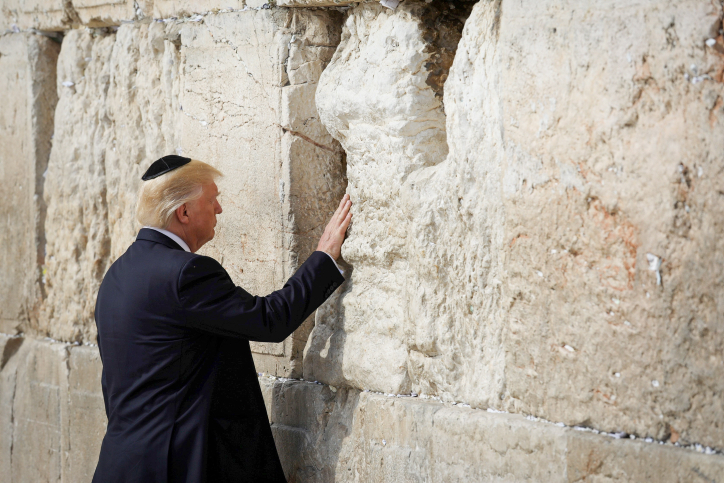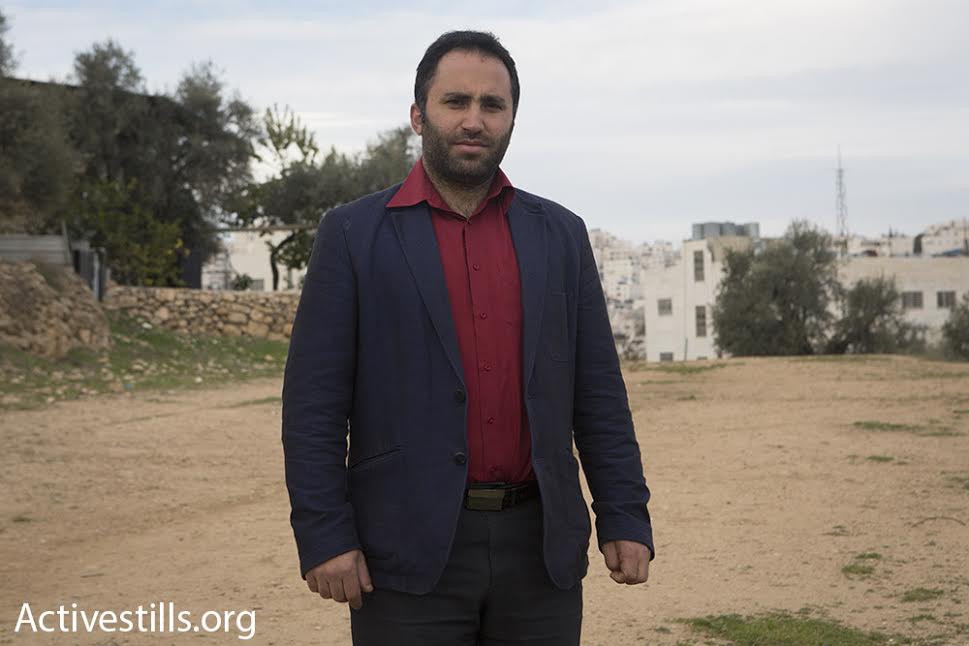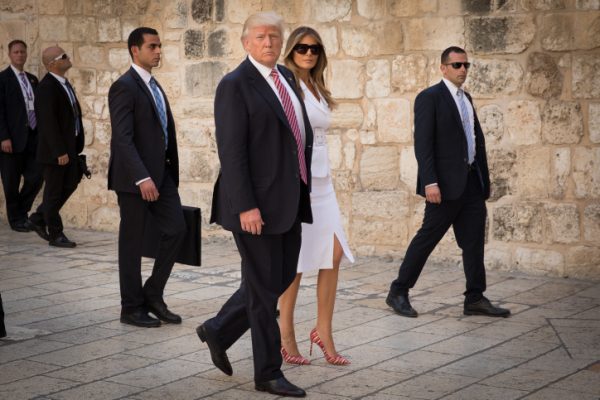President Trump has arrived in Israel, promising the ultimate deal. Ahead of the big day, a few political activists and commentators shared their thoughts on what, if anything, Trump can bring to the region.
By Yaser Abu Areesha

President Donald Trump, a man who often speaks about making the “ultimate deal” that would bring an end to the Israeli-Palestinian conflict, has landed in Israel. But despite official declarations, no one is actually sure what he wants or whether he will surprise us. What is certain is that Trump moves in mysterious ways.
The president is no longer the messiah of the extreme right in Israel, which seeks to annex the West Bank with as few Arabs as possible. The Left, for its part, looks at Trump with anxiety. Israeli and American officials have been sweating over this trip, and the only ones who have gained anything from this trip have been the Saudis, who were crowned by Trump as the leaders of the Arab world to the tune of hundreds of billions of dollars.
The Palestinian side also has trouble figuring out the president. His declarations of support for the Palestinian right to self-determination or his whimsical call for either a one- or two-state solution, which themselves do little to help Palestinians who have grown tired of lip service by world powers.
As a service to our esteemed guest, and in order to combat ignorance, I decided to turn to a few political activists and ask them what, in their opinion, is the ultimate deal Trump should propose.
First end the occupation, then have a referendum
My first interviewee was Issa Amro, an anti-occupation activist from Hebron, who runs the Youth Against Settlements organization.
Issa, Trump is here. Are you excited?
Why should I be excited? Trump represents the positions of the Israeli Right, and does not adopt any stances that will allow the Palestinian people minimum rights.

But Trump said he supports the Palestinian people’s right to self-determination.
At the same time as adopting extreme positions that support settlements and appoints a right-wing ambassador to Israel. This only proves that he supports the extreme right in Israel. In light of this situation, he will probably propose a solution according to which the Palestinians simply need to come to terms with the occupation, without ever having any autonomy over their land.
What solution should he propose then?
The solution begins with holding Israel accountable for its crimes against the Palestinian people, for the settlements, and the occupation. The solution must take into account all the demands and rights of the Palestinian people.
One state? Two states?
I won’t get into this issue because it is less relevant at this point. Right now what is important is implementing international law, first through ending the occupation and the military regime over the Palestinian people, and putting a stop to the settlements. One cannot enter negotiations and make a decision when the Palestinian people is under military occupation. We believe the solution has two parts. After implementing international law and ending the occupation, we will hold a free and democratic referendum over the question of self-determination and the will of the people.
Who will participate in this referendum?
Every thing and person who identifies as Palestinian.
Including Palestinians in Haifa and Nazareth?
Why not? Are they not Palestinians?
Open borders
Dr. Yael Berda is one of the leading voices in the “Two States, One Homeland” movement, which operates on the premise that Jews and Palestinians live all around the country, but want separate sovereignty. The movement proposes the establishment of two nation-states — one Jewish, one Palestinian — with open borders that will allow freedom to move around, live and work throughout the whole territory for all its residents, in a confederate-like arrangement.
Dr. Berda believes that such a solution will come from within, rather than being imposed from the outside, as a result of joint Palestinian-Israeli efforts outside the political arena.
So, Yael — there’ll be two states. But what about borders? Are we looking at something like the German-French border?
The proposal is indeed very similar to the current European Union model. The plan states that Palestinians will be able to go to Acre, Haifa, Jaffa, the sea.
How can we start to implement your plan?
The first thing is to address the political situation. That some people have an ID card but no citizenship is illogical.
And how do you see the visit of Trump, who’s bringing an outside solution?
Things will become more tangible. When Trump walks around the Old City of Jerusalem it will no longer be a virtual or rhetorical issue, which is a good thing. On the other hand, we know who Trump is and what motivates him.

Would you have wanted Trump’s proposed deal to be more influenced by the Two States, One Homeland movement?
Both the Right and the Left are starting to talk about the idea of “together and separate.” It’s the slogan of Peace Now and Standing Together, while on the Right they’re talking about a single territory, even though they’re currently speaking about it in racist and undemocratic terms. People are staring to understand that the conflict is not over the 1967 borders and the occupation, but over 1948.
Would you invite Trump for a cup of coffee?
We’ll invite anyone. When Palestinian citizens of Israel, who are refugees and descendants of refugees, can sit down with settlers from Israel’s ideological founding generation, and each can succeed in recognizing the other, then we can also sit down with Trump.
Only Palestinians can bring about a just solution for the Palestinian people
Niveen Abu Rahmoun, a prominent Balad party activist who has been marked as a potential future Knesset member, holds well thought-out views on the two-state solution and the transformation of Israel into a state of all its citizens, regardless of religion or ethnicity.
Niveen, Trump is on his way, and apparently with some kind of deal. Are you holding your breath? Do you have any expectations?
On the one hand he’ll bring nothing new, he’s not expected to present a formal policy plan for a solution to the Israeli-Palestinian conflict. On the other hand, the current situation for Arabs, and the lack of desire to address the Palestinian issue, makes it legitimate for Trump to back away from the matter as well. It’s quite clear that the aim of Trump’s visit to Israel is far more about discussing the situation in the region, like Syria and Iran, than to drive the peace process.
I think the core problem curbing Palestinians’ free will is the security coordination between Israel and the Palestinian Authority. In order for us to be able to advance the key issues, this coordination has to stop — it’s repressing the Palestinian struggle and it silences Palestinian political movement, which helps consolidate the settlements and preserve the Israeli military regime.
Are the two-state solution and that of a state of all its citizens still on the agenda?
Yes. The idea of state of all its citizens is a basic outlook in post-Zionist circles, which seek to “normalize” a State of Israel that will have no connection to Judaism, the Zionist movement or its values. Israel would, according to this idea, have to become a country like any other, with a common civic and political identity.
This idea also means us as Palestinians giving up on being citizen-natives, as well as attempting to define “equal rights” for someone to whom it is important to use their citizenship while being a native of this land.
Trump has declared himself in favor of the Palestinian right to self-determination.
Trump’s statements on Palestinian self-determination are changeable, and don’t demonstrate any desire or clear, serious political vision; therefore, I can’t take what he’s said seriously. But even if he intends or wants to initiate negotiations, they won’t be renewed. As such, I think the most important thing is for Palestinians to present themselves as resolute. Palestinians will determine how the new political map will look, and they will speak for themselves. Trump might listen, but as we know he has a very strong alliance with the stronger side in this equation, the Israeli side.
The bottom line is that Palestinians themselves are the ones who will bring about a just solution for the Palestinian people.
—————
After this journey through different positions on the Israeli-Palestinian conflict, only one thing is clear: it won’t be easy for President Trump. Mr. President, I’m very sorry, but this isn’t Saudi Arabia, and a deal won’t come that easily — even if you do dabke while holding a pita and falafel in Ramallah.
Yaser Abu Areesha is a student at Tel Aviv University. This article was first published in Hebrew on Local Call, where he is a blogger. Read it here.


